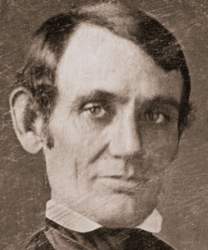Record Data
Source citation
Abraham Lincoln to John D. Johnston, Springfield, Illinois, January 12, 1851 in Roy P. Basler, ed., The Collected Works of Abraham Lincoln (8 vols., New Brunswick, NJ: Rutgers University Press, 1953), 2: 97-98, http://quod.lib.umich.edu/l/lincoln/.
Recipient (to)
John D. Johnston
Type
Letter
Date Certainty
Exact
Transcriber
Transcription adapted from The Collected Works of Abraham Lincoln (1953), edited by Roy P. Basler
Adapted by Matthew Pinsker, Dickinson College
Transcription date
Transcription
The following text is presented here in complete form, as it originally appeared in print. Spelling and typographical errors have been preserved as in the original.
Springfield, Jany. 12. 1851---
Dear Brother:
On the day before yesterday I received a letter from Harriett, written at Greenup. She says she has just returned from your house; and that Father is very low, and will hardly recover. She also says you have written me two letters; and that although you do not expect me to come now, you wonder that I do not write. I received both your letters, and although I have not answered them, it is not because I have forgotten them, or been uninterested about them---but because it appeared to me I could write nothing which could do any good. You already know I desire that neither Father or Mother shall be in want of any comfort either in health or sickness while they live; and I feel sure you have not failed to use my name, if necessary, to procure a doctor, or any thing else for Father in his present sickness. My business is such that I could hardly leave home now, if it were not, as it is, that my own wife is sick-abed. (It is a case of baby-sickness, and I suppose is not dangerous.) I sincerely hope Father may yet recover his health; but at all events tell him to remember to call upon, and confide in, our great, and good, and merciful Maker; who will not turn away from him in any extremity. He notes the fall of a sparrow, and numbers the hairs of our heads; and He will not forget the dying man, who puts his trust in Him. Say to him that if we could meet now, it is doubtful whether it would not be more painful than pleasant; but that if it be his lot to go now, he will soon have a joyous [meeting] with many loved ones gone before; and where the rest of us, through the help of God, hope ere-long to join them.
Write me again when you receive this.
Affectionately
A. LINCOLN


